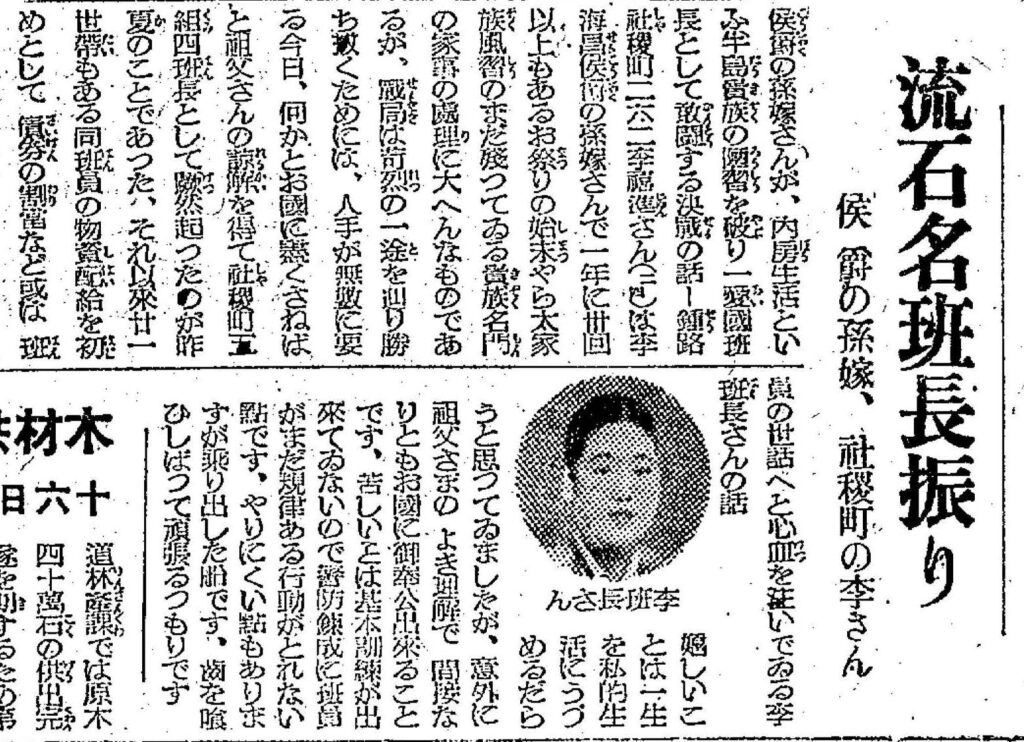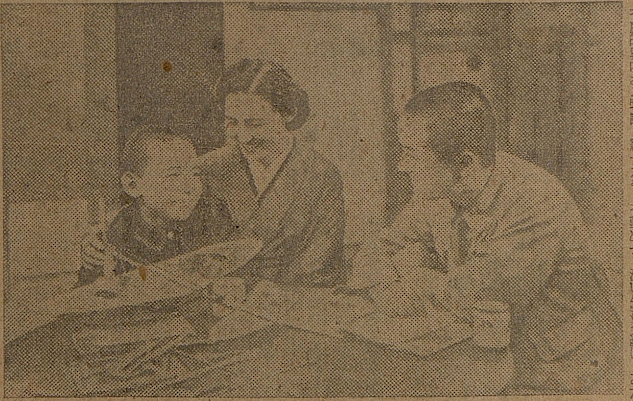This brief 1944 article is about a well-connected 24-year-old Korean woman named Yi Hui-jun (이희준/李禧準) who leveraged her connections with her powerful grandfather, Yi Hae-chang (이해창/李海昌) from the elite aristocratic Korean collaborator class, to land a comfortable job as a patriotic group leader of a patriotic group in an up-scale neighborhood of Sajik-dong, which was home to the former royal Tae family clan.
 |
| Yi Hui-Jun |
The Tae family clan was apparently privileged enough to retain its family customs and traditions even while the language and culture of the rest of the Korean population was being suppressed by the Imperial Japanese regime.
Patriotic Groups (JP: aikoku-han, KR: aeguk-ban, 愛國班) were neighborhood cells which functioned as the local arm of the Korean Federation of National Power (国民総力朝鮮連盟, 국민총력조선연맹), the single ruling party of colonial Korea. They typically consisted of a few households, led by a Patriotic Group leader, who normally acted as a mini-tyrant micromanaging the lives of everyone within the Patriotic Group. That included things like rationing food and goods, enforcing mandatory State Shinto prayer times and shrine visits, 'volunteering' laborers upon the colonial government's request, arranging marriages, holding mandatory Japanese language classes, spying on 'ideological criminals', etc.
But as a privileged Korean family clan, the Tae family clan would have probably gotten a pass on the most onerous obligations, like mandatory labor duty for things like manure collection. However, they apparently still had to perform emergency response training, which would have included things like fire extinguishing drills, first aid, and air raid drills.
As corrupt and nepotistic as their arrangement was, it would have been advantageous at least as far as Hui-jun and the Tae family were concerned. Hui-jun would be managing a group of privileged Koreans who were generally friendly towards the colonial regime, so they would have been pretty cooperative, making her job easier. In return, the Tae family would get a patriotic group leader who was from a similar background as them, so they could be sure that she would be relatively gentle on them. Perhaps Hui-jun actually married into the Tae family, since she is described as a bride. That would have made her a patriotic group leader of her in-laws, which would have made an interesting dynamic.
This got me curious about what kind of Korean man was powerful enough to pull strings in the Imperial Japanese government to secure his granddaughter a cushy job. Unfortunately for me personally, most of the available historical information online was in Korean, but I did find one Japanese language article about him, so I'm using that to share my findings about him.
Yi Hae-chang was born on October 15, 1865 in Pocheon, Gyeonggi-do, as the 13th generation descendant of Deokheung Daewongun, a famous King of Joseon who lived from 1530 to 1559. In 1889, he passed the Korean version of the grueling Imperial Chinese Keju Examinations to become a government bureaucrat in Yi Dynasty Korea. He steadily moved up in the government bureaucracy, and in 1904 he became a Panyun (Governor) of Seoul (then called Hanseongbu). He continued receiving Yi Dynasty honors and promotions through 1907. After Korea was annexed by Imperial Japan in 1910, he received the noble title of Marquis to enter the Korean collaborator aristocratic elite. He subsequently made some very powerful connections in Imperial Japanese business circles, and from 1923 to 1928, he served as an executive at Hansung Bank. He owned a lot of farmland in Gyeonggi-do. He died on March 2, 1945.
Scrolling down, you will see a raw Korean-language printout of Yi Hae-chang's entry in the Encyclopedia of Pro-Japanese Collaborationists in Korea (친일인명사전), which I am posting as it appeared on the Android app version of this book.
(Translation)
Gyeongseong Ilbo (Keijo Nippo) April 12, 1944
The quintessential patriotic group leader
A married granddaughter of a Marquis, Mrs. Yi of Sajik-dong
This is a story of a married granddaughter of a Marquis,who broke the perverse custom of living a secluded life as a Korean aristocrat, and fought bravely as a patriotic group leader.
The 24-year-old Mrs. Yi Hui-jun (이희준/李禧準), the married granddaughter of the Marquis Yi Hae-chang (이해창/李海昌) and a resident of 262 Sajik-dong, Jongno-gu, is hard at work dealing with preparations for the festivals held more than 30 times a year and the household chores of an aristocratic family that still retains the family customs of the Tae clan. It was last summer that she boldly stood up to become the leader of the Fourth Patriotic Group of the Fifth Team of Sajik-dong with her grandfather's approval. She wanted to do something to serve her country, realizing that countless hands were needed now to win the war, which was getting more and more intense.
Since then, she has been working hard, pouring her heart into the distribution of goods, the allocation of bonds, and care for the members of the patriotic group. Patriotic Group Leader Yi said,
"I thought I would spend the rest of my life buried in my own private life, but to my surprise, my grandfather understood me well and I was able to serve my country, albeit indirectly. The hardest thing is that we have not yet completed basic training, so our team members are not yet able to act in a disciplined manner during emergency response training. It is not easy, but we have only just embarked on this journey. We will grit our teeth and do our best."
Source: https://www.archive.org/details/kjnp-1944-04-12

(Transcription)
京城日報 1944年4月12日
流石名班長振り
侯爵の孫嫁、社稷町の李さん
侯爵の孫嫁さんが、内房生活という半島貴族の陋習を破り、一愛国班長として敢闘する決戦の話。
鐘路社稷町二六二李禧準さん(二四)は李海昌侯爵の孫嫁さんで、一年に三十回以上もあるお祭りの始末やら太家族風習のまだ残っている貴族名門の家事の処理に大へんなものであるが、戦局は苛烈の一途を辿り勝ち抜くためには、人手が無数に要る今日、何かとお国に尽くさねばと祖父さんの了解を得て社稷町五組四班長として蹶然起ったのが昨夏のことであった。
それ以来二十一世帯もある同班員の物資配給を初めとして、債券の割り当てなど或いは班員の世話へと心血を注いでいる李班長さんの話:
嬉しいことは一生を私的生活にうずめるだろうと思っていましたが、意外に祖父さまのよき理解で間接なりともお国に御奉公出来ることです。苦しいことは基本訓練が出来ていないので、警防錬成に班員がまだ規律ある行動がとれない点です。やりにくい点もありますが、乗り出した船です。歯を食いしばって頑張るつもりです。
(Lee Hae-chang's entry in 친일인명사전)
이해장 李海昌| 1865~1945
후작
1865 년 11 월 15일 경기도 포천에서 태어났다. 본관은 전 주, 자는 배언(拜言)이댜 1889 년 12월 알성시(謁聖試) 병 과(丙科) 42위로 합격해 홍문관 교리에 제수되었다.1892 년 5월 사간원 대사간에 임명되어 1895 년 8월 장례원 종정 사장(宗正司長), 1896 년 12월 봉상사 부제조, 1897 년 8월 강화부윤, 1899 년 8월 태복사장, 1900 년 2월 봉상사장 등 을 거쳐 5월에는 장례원 장례를 겸임했다.1900 년 9 월, 강 화부윤으로 있을 때 강화도 정족산성(鼎足山城) 사고(史 庫)에 보관돼 있던 실록(實錄) 일부를 잃어버린 책임으로 전남 지도군 고군산(古群山)으로 3 년 유배형에 처해졌다 가 실록을 잦게 되어 10월에 사면되었다.1901 년 10월부터 1903 년 8월까지 여러 자례 비서원승을 지냈고, 1904 년 10 월 한성부 판윤에 임명되었다.1904 년 11 월 4일 장산도정 (昌山都正)에 봉해졌다가 다음 날 장산군(昌山君)에 봉해 졌다.
1908 년 8월 기호흥학회 잔무부(贊務部) 특별주무원(特別主務員)으로 활동하면서 12월부터 특별찬성회원으로 1500환율 매달 25환씩 나눠 기부하여 부족한 재정율 도왔 다 같은 해 10월 일본적십자사 총회에서 특별사원에 위족 되었고, 11 월 대한산림협회 명예회원으로 잠여했다. 대한산 림협회는 일제가 전국의 산림 측량 등을 목적으로 설지한 단 제로 일본인 측량기사를 조빙해 산림 측량 등을 비롯한 산 림사업을 주관했다. 같은 해 12월 자지단제인 한성부민회의 하부단제로 인달방(仁達坊)적선방(積善坊)의 방호1(坊會) 조직을 위한 발기인으로 잠여했다.
합병 직후인 1910 년 10월 〈조선귀족령〉 에 따라후작작 위를 받았다. 같은 해 11 월 ‘조선귀족 일본관광단’의일행으 로 전황의 생일인 천장절(天長節) 연회에 조대받고 천황이 하사하는 주병(酒瓶)을 받았다. ‘조선귀족 일본관광단'은 조 선총독부가 비용 전액을 후원하여 일본 전황에게 사은의 뜻을 표하기 위해 조직되었다.1911 년 1 월 은사공재 16 만 8000원을 받았고, 2월에는 종독 관저에서 열린 작기본서봉 수식(爵記本書捧受式)에 의복을 갖주어 잠석했다.1912 년 8월 한국병합기념장을 받았고, 12월 종4위에 서위되었다. 1915 년 7월 조선총독부 주도로 식민지배를 정당화하고 시 정사업을 선전하기 위한 시정 5 년기념 조선물산공진회 경성 협찬회의 유공회원(有功會員)으로 기부했다.1915 년 11 월 다이쇼(大正)천황 즉위기념 대례기념장율 받았고, 1917 년 12월 정 4위로 승서(陞敍)되었다.1918 년 8월 경성구제회 (京城救濟會)에 기부했다.
1919 년 1 월 고종의 국장(國葬)과 1926 년 4월 순종의 국 장 때 종적집사를 맡았다.1923 년 1 월 주식회사 한성은행 (漢城銀行) 제 35 회 정기 주주종회에서 감사역에 선줄되어 1928 년까지 재임했다.1926 년 6월부터 1935 년까지 주식 회사 선일지물(鮮一紙物) 감사를 지냈다• 1924 년 1 월 종3 위로 승서되었고, 1928 년 11 월 쇼와(昭和)전황 즉위기념 대례기념장을 받았다.1929 년 9 월 도박과 아편 등으로 몰락 해 가는 조선 귀족들의 파산율 구호하기 위해 조직된 재단법 인 장복회(昌福會)에서 1930 년 1 월 생활보조비로 지급한 교부금 250원을 받았다.1937 년 6월 현재 경기도 양주와 연전 일대에 각각 논밭 합계 30정보(町步 : 약 9 만 평) 이상 을 소유한 대지주였다. 같은 해 8월 조선종독부가 중일전쟁 이후 시국인식을 강화하기 위해 마련한 시국간담회에 잠석 했다 1939 년 11 월 조선총독부의 지원으로 전국 유림단제 를 연합하여 총후봉공을 위한 정신운동에 나서도록 족구하 기 위해 조직된 조선유도연합회(朝鮮儒道聯合會)의 잠여 (參與)에 선출되었댜 1940 년 11 월 기원 2600 년축전 기념 식전 및 봉축회에 조대받고 기원 2600 년축전기념장을 받았 다. 1941 년 10월 종2위로 후작 작위를 유지하다가 1945 년 3월 2일 사망했다. 특지(特旨)로 정 2위에 주승되었다. 장남 이덕주(李德柱)가 1914년 6월 사자(嗣子)로 종 5위에 서위되어 사령서를 받았고, 이해창이 사망한 날에 호주를 상 속했다 해방 후, 1949 년 5월 반민특위에서 습작(襲爵)한 당연범으로 조사를 받았으나 특별검찰부에서 무혐의 저분 을 받았다. 자남 이흥주(李興柱)의 저는 중주원 부찬의 홍우 석(洪祐晳)의 딸로서 애국금자회 간사를 지낸 홍승원(洪承 嫄)이다.
[잠고문헌]
《日省錄》; 《高純宗實錄》; 《舊韓國官報》; 《朝鮮總督府官報》; 《(日本內閣)官報》; 《皇城新聞》1906.9.12, 1908.10.27, 11.5, 12.8 ; 《新韓民 報》1910.11.2 ; 《新韓國報》1910.10.25 ; 《韓 民》1936.8.29 ; 《東亞日報》1924.1.10 ; 《每日申 報每日新報》1910.10.8, 11.5, 1911.2.23, 1915.7.11, 1918.8.29, 1919.7.15, 1923.1.23, 1937.8.21, 1945.3.4 ; 《京城新報》1910.10.8; 《京城日報》1925.1.22 104, 1926.5.2 ; 《聯合新聞》1949.5.29 ; 《漢城日, 報》1949.9.8 ; 《畿湖興學會月報》제 1 호(1908.8), 제 5호(1908.12) ; 《經學院雜誌》제 45호(1940.12) ; 《韓 國併合記念章授與人名> (1913) ; 《(大正)大禮記念章 授與人名錄》; 《大禮記念章裁可書(昭和4年)》第 二十九; 〈〈大韓山林協會(趙旨書·規約·細則要領·說明 書)》(1908.11 ) ; 〈韓官人ノ經歷一般(1909. 5)> ( 《統 監府文書》8) ; 〈朝鮮貴族略歷(1925.10) 〉( 《齋藤實 文書》100-3-850) ; 〈朝鮮貴族略歷(1929.12) 〉( 《齋 藤實文書》100-4-851) ; 〈朝鮮人ニ對スル授爵二關 スル意見(1926.11.22) 〉 ( 《齋藤實文書》100-6-843) ; 〈朝鮮貴族名簿(1929.11 .1 현 재)〉 ( 《齋藤實文書》 100-7-853) ; 〈朝鮮貴族名簿〉(1941.10 현재) ; 《朝 鮮年鑑》(1 945) ; 《朝日年鑑》(1 933, 1 934, 1 937 1939, 1942, 1944) ; 《每日年鑑》(1940) ; 《朝鮮貴族 列傳》(1910.12) ; 《朝鮮紳士名鑑》(1911.5) ; 《朝鮮 紳士寶鑑(1913 年版)》(1913.6) ; 《朝鮮紳士大同譜》 (1913.12) ; 《始政五年記念朝鮮物産共進會京城協贊 會報告》(1916.3) ; 《朝鮮銀行會杜(組合)要錄》(1923, 1925, 1927, 1929, 1931, 1933, 1935) ; 《朝鮮實業要 錄》(1935.9) ; 《1937年版朝鮮都邑大觀》(1937.3) ; 《紀元二千六百年祝典記念光榮錄》(1941.10) ; 《恩 賞考》(1944.7) ; 《民族正氣의 審判》(1949.4) ; 《農地 改革時被分配地主및 日帝下大地主名簿》(1985.12) ; 《朝興銀行百年史》(1997.3)





















